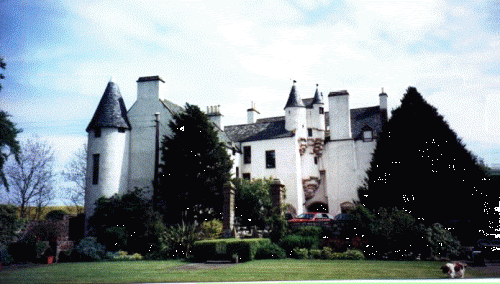Variations of the name include Allardyce and Allardes. The name originates from the old barony of Allardice in the parish of Arbuthnott, Kinkardineshire. The recipient of a charter of William the Lion of the lands of Alrethis took his name from the area. It is thought that it gained it’s name from the Middle English […]
Tag Archives: Clan Allardice History
Variations of the name include Allardyce and Allardes. The name originates from the old barony of Allardice in the parish of Arbuthnott, Kinkardineshire. The recipient of a charter of William the Lion of the lands of Alrethis took his name from the area. It is thought that it gained it’s name from the Middle English “aller” (Olde English pre 7th Century “alor”), alder, and an uncertain second element, thought to be the Gaelic “deas”, south (facing). “It is not a very common name, but all who hold it believe in their descent from the old family which was settled for so long a period on the banks of the Bervie Water”.
The first recorded spelling of the family name is shown to be that of Alexander de Allyrdas, which was dated 1294, in the “Episcopal Register of Aberdeen”, during the reign of John Balliol, Ruler of Scotland, 1292 – 1296. Alexander de Allyrdas who witnessed a charter of the lands of Glack around 1294 is likely the same Alisaundre de Allerdashe of the county of Kinkardyn who rendered homage in 1296. Walter de Allerdas also rendered homage in the same year.
The Castle of Allardice is situated one mile north west of Bervie, the L-plan tower house of the Allardice family was built at the end of the 16th century on a terrace surrounded on three sides by a deep river meander. When the castle passed to the Barclays of Urie by marriage in the late 18th century, it declined into a farmhouse. It was damaged by fire in the 1970s but restored by William Cowie, an Aberdeen architect, whose home it remains. The castle was probably built for John Allardyce (d. c.1606), who married a daughter of the 3rd Earl Marischal. His great-great-grandson, Sir John Allardice (1641-76), married a sister and co-heir of the 8th Earl of Menteith and 2nd Earl of Airth, giving rise to a family claim on these earldoms, and giving the family lineal descent from King Robert II of Scotland. Although well known in the 18th century, the claim was not pursued until the 19th century largely because Sir George Allardyce left the family in debt and the funds to fight the claim were not readily available. The cost of proceedings also hampered the three unsuccessful claims which were made by later generations in the House of Lords between 1834 and 1907.
Sir George Allardyce (1672-1709), was an MP and Master of the Mint in Scotland in the early 18th century, and extended the castle about 1695. His grandson, James Allardice, died in 1765 leaving an only daughter and heir, who by her marriage to Robert Barclay carried the Allardice name and estates into that family. Her son, Capt. Robert Barclay-Allardice (1779-1854) achieved some fame as ‘the celebrated pedestrian’, for various feats of endurance walking in the early 19th century. It was he who first pursued the claim to the family’s Scottish earldoms, in 1834. His daughter and heir, Margaret Barclay-Allardice (1816-1903) was apparently born before her parents’ marriage, but under Scottish law was legitimated by it. She settled in America and sold the Barclay and Allardice family estates at Ury and Allardice in 1854, but this did not prevent her also perusing the claim to the earldoms in 1870. She married twice and on both occasions resumed her maiden name after the death of her husband. A final attempt to claim the earldoms was made in 1907 by her elder son, Robert Barclay-Allardice (b. 1841), who made money as a stockbroker in New York and retired to Cornwall, where he became mayor of Lostwithiel 1898-1900 and 1904-06. In 1909 he married his housemaid, Beatrice Jeffrey, and shortly afterwards they had a daughter, the last member of the family to live in England. In 1910 he was declared bankrupt and although still alive in 1914 it is likely that he died shortly afterwards, probably overseas, as no record of his death has been found in the UK.

